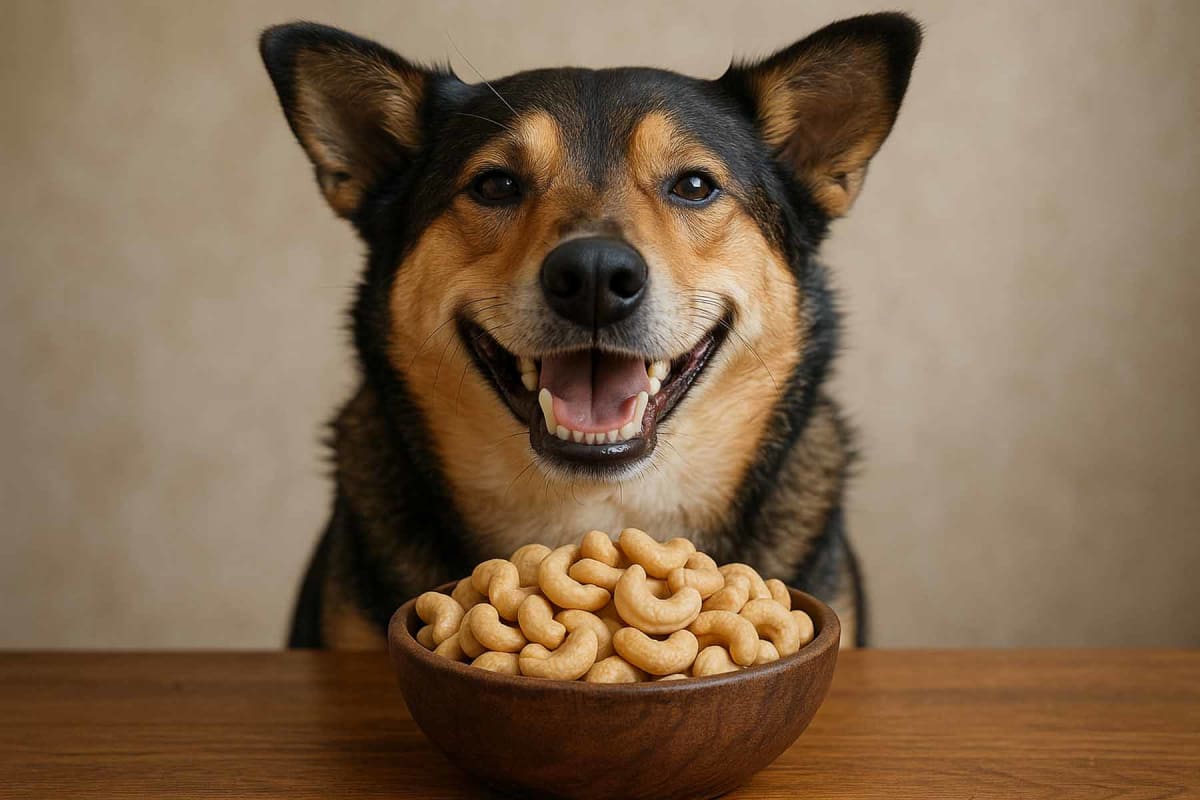
Can dogs eat cashews?
Can dogs eat cashews?
Can dogs have cashews?
Cashews, with their creamy texture and delicious taste, might catch your dog's attention when you're enjoying them as a snack. But are cashews safe for dogs?
The short answer is yes, dogs can eat cashews in small amounts. Unlike macadamia nuts, which are toxic to dogs, plain, unsalted cashews are not poisonous to our canine companions. Cashews contain beneficial nutrients like protein, healthy fats, and antioxidants that could potentially offer some health benefits.
However, while cashews are not toxic to dogs, there are several precautions you should take when considering sharing this nutty snack with your four-legged friend.
Are cashews bad for dogs?
While not inherently "bad" for dogs, cashews do come with several concerns that pet owners should be aware of before sharing them:
High fat content: Cashews are high in fat, which can lead to pancreatitis in dogs if consumed in large quantities. Pancreatitis is a painful inflammation of the pancreas that can be serious and even life-threatening for dogs.
Calorie density: These nuts are calorie-dense, which means they can contribute to weight gain and obesity if given frequently. Even a few cashews can add significant calories to your dog's daily intake.
Salt and seasonings: Many packaged cashews contain salt, seasonings, or flavorings that can be harmful to dogs. Salt can lead to excessive thirst and urination, and in severe cases, sodium ion poisoning. Seasonings might contain ingredients toxic to dogs, such as garlic or onion powder.
Choking hazard: Whole cashews can pose a choking risk, especially for small dogs or those who tend to gulp their food without proper chewing.
Allergic reactions: Just like humans, some dogs may have allergies to nuts, including cashews. Signs of an allergic reaction include itching, swelling, difficulty breathing, or gastrointestinal upset.
How to safely share cashews with your dog
If you've decided to give your dog cashews as an occasional treat, follow these guidelines to ensure their safety:
Always use plain, unsalted, and unseasoned cashews.
Make sure the cashews are roasted, not raw, as raw cashews may contain harmful toxins.
Break or chop the cashews into smaller pieces to prevent choking.
Introduce cashews gradually and in very small amounts to monitor for any adverse reactions.
Count cashews as part of your dog's daily treat allowance (treats should make up no more than 10% of your dog's daily caloric intake).
Can dogs eat cashew butter?
Dog owners can give their furry friend plain cashew butter without added sugar, salt, or artificial sweeteners (especially xylitol, which is toxic to dogs) in very small amounts. However, the same concerns apply—it's high in fat and calories.
A safer way to offer cashew butter would be to use it as an occasional filling for puzzle toys or frozen treats. A little goes a long way, especially for small dogs.
How many cashews can I give my dog?
The appropriate number of cashews depends on your dog's size, weight, and overall health:
Small dogs (under 20 pounds): No more than 1 to 2 cashews per week
Medium dogs (20 to 50 pounds): No more than 3 to 4 cashews per week
Large dogs (over 50 pounds): No more than 5 to 10 cashews per week
Always consult with your veterinarian before introducing any new treats to your dog's diet, especially if your dog has existing health conditions like diabetes, pancreatitis, or obesity.
Other dog-safe treat options
If you're looking for healthier alternatives to cashews, there are many human foods dogs can eat as an occasional treat, including:
Fruits & vegetables: Many fruits and vegetables make excellent low-calorie treats for dogs. Some options include:
Apple slices (no seeds)
Carrot sticks
Blueberries
Cucumber slices
Green beans
Lean proteins: Small pieces of cooked, unseasoned lean meats can be healthy treats:
Chicken
Turkey
Lean beef
Commercial dog treats: There are many healthy commercial dog treats available that are specifically formulated for canine nutritional needs. Look for options with simple, natural ingredients and no artificial preservatives or colors.
When it comes to your dog's nutrition, it's always best to prioritize a balanced dog food formulated for their specific needs and to use treats—including cashews—sparingly. Remember that your veterinarian is the best source of advice for your individual dog's dietary needs and restrictions.
When to contact your veterinarian
If your dog has eaten cashews and shows any of these symptoms, contact your veterinarian immediately:
Vomiting or diarrhea
Signs of abdominal pain
Lethargy
Loss of appetite
Excessive thirst or urination
Difficulty breathing
Swelling, especially around the face